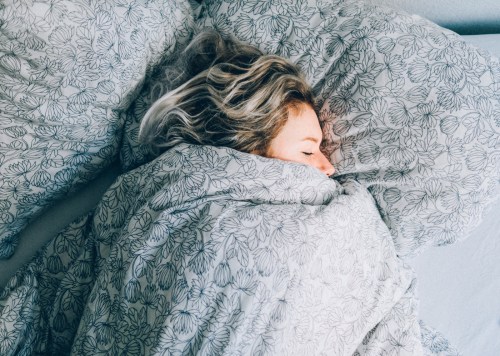As editor-in-chief and co-founder of Miss Grass, an elevated lifestyle shop and publication for women and cannabis, Anna Duckworth has tried cannabis for everything from sex to cooking. And now, she’s sharing her cannabis knowledge with Well+Good. Today, she takes on a topic we’re all more than a little bit obsessed with over here: how to get a better sleep.
We are an exhausted nation: Roughly 70 million Americans suffer from chronic sleep disorders. And, considering lack of sleep can lead to mood and personality changes, we’re a cranky one, too. To put it simply, we’re tired of being tired and we’re looking for solutions.
Cannabis—CBD (cannabidiol, the non-psychoactive component of cannabis that’s cropping up in everything from lotions to lattes) in particular—is a tantalizing alternative to the typical Ambien prescription or medicine cabinet full of melatonin that, according to Elizabeth Cramer Ernst, nurse practitioner and owner of the medical marijuana clinic Hamptons Medi Spa, could provide significant relief for insomniacs. In recent studies, CBD has shown promising signs of being both an effective and safe way to get more zzz’s, although much more research needs to be done before definitive conclusions can be drawn.
Through the fog that comes with pulling unintended all-nighters night after night, however, it’s easy to lose sight of the fact that difficulty sleeping is very rarely just that. It’s almost certainly the result of an underlying condition. For many people, a lack of sleep comes down to anxiety—which, as we know, can be attributed to any number of external or internal factors from PTSD to financial strain. For others, sleepless nights are rooted in something physical, like chronic pain or restless leg syndrome. That’s why there’s truly no one-size-fits-all solution for sleep problems—including cannabis.
To find the best way for you to use cannabis or CBD oil for sleep, follow these three steps. And remember, it’s important to speak with your doctor before adding any new supplements to your routine.
1. Get to know your options
Cannabis remains illegal for recreational and/or medical use in many states. The good news for the canna-curious who live in a state that’s still under prohibition is that the passing of the Farm Bill in late 2018 federally legalized hemp, the cannabis plant that contains less than 0.3 percent of the psychoactive compound known as THC (tetrahydrocannabinol). And that means you can now legally access a whole range of hemp-derived cannabis products no matter where you live.
If you’re experienced with products that contain THC, know that some amount of the high-inducing compound can be effective in treating sleep disorders. But if you’re new to the cannabis party, it’s recommended to start with non-intoxicating cannabis products. These contain a high concentration of other active compounds—like the ever popular CBD (cannabidiol) or the lesser known but powerful sedative CBN (cannabinol)—that work by activating a network of receptors in the body known as the endocannabinoid system. Ultimately, your job is to test and try different products to find the dose just right for you.
2. Identify your main sleep issues
Everybody and every body is different. When you’re deciding on a course of treatment for sleep issues, first ask yourself this question: Do you have trouble falling asleep, staying asleep, or both?
According to Cramer Ernst, when using cannabis or CBD oil for sleep, there are a range of products from short-acting ones that can help you fall asleep fast to long-acting ones that can help you stay asleep, so you want to make sure you pick the one that addresses your particular ailment.
A vaporizer like the Her Highness Sleeping Beauty Vape Pen is considered short-acting because it takes effect in less than 10 minutes and is great for people who need help falling asleep. A tincture under the tongue, like Mineral’s Robyn for Sleep, is considered medium-acting because it takes 20 minutes to kick in and lasts between four and five hours. And then there are the edibles or capsules, like Plant People’s Be Calm Caps, which can take up to two hours to take effect but typically last between six and eight hours. (These long-acting ones are a great bet for people who can nod off easily but need help staying asleep.)
3. Integrate CBD into your sleep hygiene routine
So many of us stay up late working or scrolling through Instagram and don’t shut off our screens until it’s way too late (guilty!). Blue light from the screens has been proven to interrupt sleep dramatically and, experts say, should be avoided for up to four hours before bedtime. That’s not realistic for a lot of us, but even putting your phone down and turning off the TV an hour before you snuggle between the sheets can make a difference. It also helps to keep a regular sleep schedule so your body can start to anticipate the routine and begin shutting down without you having to force it.
One easy way to ease off the tech and begin regularizing your sleep habits is to create a bedtime ritual for yourself (with or without CBD—but, me being me, I vote for “with”). Practice meditation if that’s your jam, spritz your skin and bed with a soothing lavender spray, dim the lights, and give yourself a little massage with something like Apothecanna’s Calming Body Oil. One of my favorite tricks is to take a CBD bath with Vertly CBD Bath Salts or the CBD Bliss Bath Bomb, which Cramer Ernst says works by being absorbed into your skin. The mood-boosting power of a good soak plus CBD could be just the ticket to Dreamland you’ve been after.
Did you know CBD can also be applied topically to soothe muscle soreness? And over in the beauty aisle, these are the mind-body-skin benefits of getting a CBD facial.
Sign Up for Our Daily Newsletter
Get all the latest in wellness, trends, food, fitness, beauty, and more delivered right to your inbox.
Got it, you've been added to our email list.











